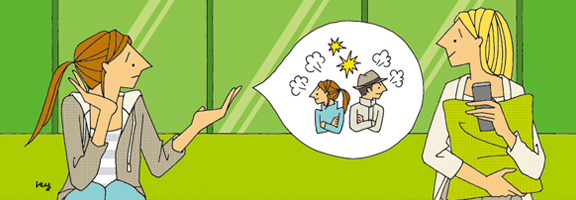会話を学ぶ「英会話講座」
2015.10.28
友達に恋愛相談

<Amandaは親友のDeniseと一緒にテレビを見ています。テレビでは恋愛相談の番組が始まったところです。>
EnglishJapanese
Amanda:Can we change the channel, please? I’d rather not watch that. It hits too close to home.
Denise:Oh? How come?
Amanda:Uh… Well, things with Joey just aren’t going so well at the moment.
Denise:Seriously? I thought you said this was the best relationship you’ve ever been in!
Amanda:Yeah, it all seemed great at first. But what goes up must come down, I guess.
Denise:Aw, that’s a real bummer. I’m so sorry to hear that.
Amanda:It’s fine, don’t worry. I’ll figure it out.
Denise:So what are you going to do? Will you break up with him?
Amanda:I don’t know… At this point, I just feel like I’m already in too deep, you know?
Denise:Yeah, I know what you mean.
Amanda:And it’s not all bad. We had a big argument last night, but maybe we can work it out.
Denise:Well, if you need someone to talk to, you know I’m always here for you.
Denise:Oh? How come?
Amanda:Uh… Well, things with Joey just aren’t going so well at the moment.
Denise:Seriously? I thought you said this was the best relationship you’ve ever been in!
Amanda:Yeah, it all seemed great at first. But what goes up must come down, I guess.
Denise:Aw, that’s a real bummer. I’m so sorry to hear that.
Amanda:It’s fine, don’t worry. I’ll figure it out.
Denise:So what are you going to do? Will you break up with him?
Amanda:I don’t know… At this point, I just feel like I’m already in too deep, you know?
Denise:Yeah, I know what you mean.
Amanda:And it’s not all bad. We had a big argument last night, but maybe we can work it out.
Denise:Well, if you need someone to talk to, you know I’m always here for you.
Amanda:チャンネル変えてもらえるかしら?できれば見たくないわ、これ。ぜんぜん他人事とは思えないから。
Denise:えっ?どうして?
Amanda:その… Joeyとあんまりうまくいってないのよ、今。
Denise:本当に?今まで付き合ったうちで一番うまくいってるって言ってなかったっけ?
Amanda:うん、最初は何もかもうまくいってるように思えたの。でも、盛り上がった気持ちもいつかは必ずさめるものなのよね。
Denise:あら、本当にがっかりね。すごく気の毒だわ。
Amanda:大丈夫よ、心配しないで。何とかするから。
Denise:どうするつもりなの?あの人とは別れるつもりなの?
Amanda:どうかしら… もう簡単には別れられないところまできちゃってる感じがするわ。わかる?
Denise:うん、あなたの言いたいことわかるわ。
Amanda:それに悪いことばかりじゃないし。昨日の夜、すごいケンカしちゃったんだけど、たぶん解決できると思うわ、私たち。
Denise:まあ、誰か相談する相手が必要になったら、いつでもここにくればいいってわかってるわよね。
Denise:えっ?どうして?
Amanda:その… Joeyとあんまりうまくいってないのよ、今。
Denise:本当に?今まで付き合ったうちで一番うまくいってるって言ってなかったっけ?
Amanda:うん、最初は何もかもうまくいってるように思えたの。でも、盛り上がった気持ちもいつかは必ずさめるものなのよね。
Denise:あら、本当にがっかりね。すごく気の毒だわ。
Amanda:大丈夫よ、心配しないで。何とかするから。
Denise:どうするつもりなの?あの人とは別れるつもりなの?
Amanda:どうかしら… もう簡単には別れられないところまできちゃってる感じがするわ。わかる?
Denise:うん、あなたの言いたいことわかるわ。
Amanda:それに悪いことばかりじゃないし。昨日の夜、すごいケンカしちゃったんだけど、たぶん解決できると思うわ、私たち。
Denise:まあ、誰か相談する相手が必要になったら、いつでもここにくればいいってわかってるわよね。
キーフレーズ
“hit (too/a little too) close to home” 痛いところを突く
ある事柄が自分の置かれている状況や抱いている感情と似通っていて、とても他人事とは思えず、不快な気持ちになったり、気まずく感じたりすることを意味するフレーズです。“too”なしで使った場合は肯定的な意味にもなります。
例)Nelsonは数週間前に借りた本を友人のCindyに返そうとしています。
Nelson:Sorry, but I didn’t really enjoy it as much as you did, I think. Why did you recommend it?
Cindy:Well, I could really empathize with the protagonist, so I guess it just hit close to home for me.
Nelson:ごめん、でも君ほど楽しめなかったかも、この本。どうして、この本僕に薦めたの?
Cindy:そうね、私の場合はすごく主人公に感情移入できたの。まあ、私にとってはとても他人事とは思えない話だったからかもね。
Nelson:Sorry, but I didn’t really enjoy it as much as you did, I think. Why did you recommend it?
Cindy:Well, I could really empathize with the protagonist, so I guess it just hit close to home for me.
Nelson:ごめん、でも君ほど楽しめなかったかも、この本。どうして、この本僕に薦めたの?
Cindy:そうね、私の場合はすごく主人公に感情移入できたの。まあ、私にとってはとても他人事とは思えない話だったからかもね。
“what goes up must come down” いい時もあれば悪い時もある
人生には必ずいい時と悪い時があり、常に自分にとって好ましい状況が続くわけではないことを言うために使われるフレーズです。
例)Frankは近所に住むBobとポーカーをしています。連勝が途切れたBobは突然、Frankに勝てなくなってしまいました。
Bob:Oh no! I was doing so well!
Frank:Well, you know what they say. What goes up must come down.
Bob:まいったな!さっきまではうまくいってたのに!
Frank:まあ、よく言うだろ。人生いい時もあれば悪い時もあるって。
Bob:Oh no! I was doing so well!
Frank:Well, you know what they say. What goes up must come down.
Bob:まいったな!さっきまではうまくいってたのに!
Frank:まあ、よく言うだろ。人生いい時もあれば悪い時もあるって。
“bummer” 残念なこと
これは不快な状況やがっかりさせられるような経験に対して使われるカジュアルな表現です。
例)Oliverが退職する同僚のJaneに送別会には行けなくなったと伝えています。
Oliver:I’m so sorry, Jane… I was really hoping I could come, but I’ve got a ton of tasks to finish by tonight.
Jane:Bummer! I really would’ve liked for you to be there.
Oliver:本当にごめん、Jane… すごく行きたかったんだけど、今日中に終えないといけない仕事が山ほどあって。
Jane:がっかり!本当に来てほしかったのに。
Oliver:I’m so sorry, Jane… I was really hoping I could come, but I’ve got a ton of tasks to finish by tonight.
Jane:Bummer! I really would’ve liked for you to be there.
Oliver:本当にごめん、Jane… すごく行きたかったんだけど、今日中に終えないといけない仕事が山ほどあって。
Jane:がっかり!本当に来てほしかったのに。
“(be) in too deep” 深くはまっている
ある状況や人との関係などに非常に深く関わっているためにそうした状況や関係に対処するのが難しいことや、そこから抜け出せないことを意味するフレーズです。
例)職場で他部署の同僚のプロジェクトに関わることになってしまったEddieが友人のJillと話しています。
Jill:Woah, so he’s making you give the presentation instead of him? That’s not your responsibility!
Eddie:I know… I never should have agreed to help, but it’s too late now. I’m in too deep.
Jill:ええっ、じゃあ、あなたがその人の代わりにプレゼンしないといけないの?それってあなたの仕事じゃないじゃない。
Eddie:そうなんだけど… 手伝うなんて言わなきゃよかったよ。でも、手遅れ。もう深く関わりすぎてるもん。
Jill:Woah, so he’s making you give the presentation instead of him? That’s not your responsibility!
Eddie:I know… I never should have agreed to help, but it’s too late now. I’m in too deep.
Jill:ええっ、じゃあ、あなたがその人の代わりにプレゼンしないといけないの?それってあなたの仕事じゃないじゃない。
Eddie:そうなんだけど… 手伝うなんて言わなきゃよかったよ。でも、手遅れ。もう深く関わりすぎてるもん。


 【Gabaからのお知らせ】
【Gabaからのお知らせ】 【特集】
【特集】 【英単語の正しい使い分け】
【英単語の正しい使い分け】 【使いこなす句動詞】
【使いこなす句動詞】